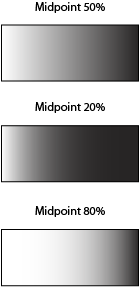- From: Rik Cabanier <cabanier@gmail.com>
- Date: Mon, 24 Sep 2012 05:17:45 +0200
- To: Lea Verou <lea@w3.org>
- Cc: Brad Kemper <brad.kemper@gmail.com>, "Tab Atkins Jr." <jackalmage@gmail.com>, www-style list <www-style@w3.org>
- Message-ID: <CAGN7qDDJT57vyrzq-psY7Y1HEWdY+qsz2vZJKPEWJTBTiQM=Yg@mail.gmail.com>
For people who don't know what the 'midpoint' is, it defines the points between 2 gradient stops where the color is the average of the 2 colors. Current gradients have this always defined at 50%, but PDF and Adobe's applications (and probably most other graphical tools) allow you to move this point. I've attached a simple example that shows how the midpoint changes the rendering of a white-to-black gradient. Rik On Sun, Sep 23, 2012 at 4:20 PM, Lea Verou <lea@w3.org> wrote: > Itís only a pair now, in the future it might be extended to allow for more > things. For example, Rik Cabanier recently suggested in a discussion we had > that it might be useful to allow an optional midpoint, like Adobe products > traditionally supported. Of course, in that case, a specific relative order > would be necessary, since they would both be of the same type. > > As an author, I find it easy to remember the order of values, but I find > it even easier when I don't have to commit any order to memory. This might > have to do with the way my memory works: I first learn the tokens I need to > use, and then their order is an additional piece of information I need to > store. > > My experience seems to be on par with what I hear from most other authors > at conferences when this topic comes up. In fact, ever since I joined W3C > and the CSSWG, they often bring it up themselves, to complain that a > specific order is mandatory! When that happens, I explain that it's needed > for disambiguation, which is also a useful way for them to remember when a > specific order is necessary. However, disambiguation is not a problem here, > so that mnemonic device goes to the trash. > > Having only two values doesn't seem to be an issue in shorthands: The > columns [1] shorthand only accepts two values as well, but it accepts them > in any order. > > I understand the arguments against allowing the position to be first, but > I think flexibility and ease of recall is a higher goal than subjective > readability. But that's just me :) > > [1]: http://www.w3.org/TR/css3-multicol/#columns > > On Sep 23, 2012, at 03:57, Brad Kemper wrote: > > > On Sep 22, 2012, at 2:45 AM, Lea Verou <lea@w3.org> wrote: > > > >> Your arguments could apply to most CSS shorthands. Do you disagree with > them as well? > >> For example, background could easily have a "50% black" sequence. > > > > That's not the same. This is not a sequence of many different values as > with background. It is a pair: a color and a length. It is more like saying > "to top" instead of "top to". I'm an author, and I find it pretty easy to > remember the order when there are only two possibilities, and one is > clearer than the other. > > >
Attachments
- image/png attachment: gradient_mid_point.png

Received on Monday, 24 September 2012 03:18:14 UTC